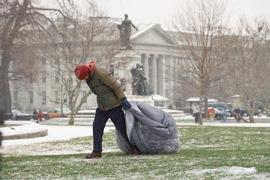“Drop a nickel in his hat
Like a rich aristocrat.”
—Organ Grinder’s Swing
Sometime in the fall of 1958, an old fellow came up to me late one night on MacDougal Street and said, “Mister, I’m writing the book of my life and I need a dime to complete it.” I gave him my last dollar and went off happy. This kind of inspired, seemingly spontaneous panhandling differs from what professional beggars do. They employ props: crutches, head-bandages, wooden legs, or have a skinny, sad-eyed dog accompanying them. They stage a theatrical performance for your benefit and hope for the best.
I saw a gypsy woman outside Saks Fifth Avenue carrying a dying child in her arms. The mother’s face was contorted with pain as she threw pleading, tearful glances at people rushing by. She must have been a recent arrival to these shores with not enough English and money to set up a storefront with a sign saying: If you are in love, or have money problems, your future is like an open book to me. Her little scam with the child may have worked outside some holy shrine famous for its miraculous cures in Europe, but it had no effect here. The boy was about four years old. The only thing he seemed to be suffering from was the boredom from having to fake illness on a beautiful spring afternoon.
In the meantime, the mother had noticed me laughing and was starting to give me dirty looks when I drew closer to her and yelled something in Serbian. She almost dropped the child in astonishment. He opened his eyes and shifted in her arms to look at me. “You go fuck yourself, too,” she shouted back at me in our native lingo and hurried away in the crowd.
However, the shock of finding a homeless, dying man on the sidewalk, as I did the other morning, or a veteran of the Iraq war one cold autumn night with a cardboard sign explaining his predicament, is no laughing matter. I read in The Times that on any given night, the government estimates there are 131,000 former soldiers bedding down wherever they can.

They are not alone. Walking around late at night one catches glimpse of many heavily bundled men and women in dark corners of the city. Last fall, I saw a gray-haired woman standing in a doorway of an office building on Madison Avenue with her hand outstretched. I gave her a five-dollar bill and she surprised me by asking: “How much change would you like back, Sir?” She had the proper manners of an old-time governess, a schoolteacher or a small town librarian. It was astonishing she should be without a roof over her head.
The couple of times in my life I found myself short of money for a subway fare, I got a taste of what being homeless meant. One winter night it was so cold, I had no choice but to start stopping people and asking them for spare change. The two well-dressed men, one young and one old, I summoned courage to approach, turned their heads and hurried away from me. Finally, an elderly black woman came my way and I asked again. She took her time opening her purse, searching inside it, and then, after looking me over carefully once more, she slowly took out a quarter. I thanked her and ran off to catch the subway downtown.



